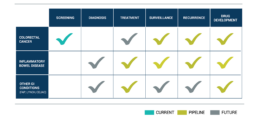Partnering with Geneoscopy
Geneoscopy offers partnerships for biopharma and research of gastrointestinal and other inflammatory and oncologic diseases.
BioPharma Partnerships
The variable nature of gastrointestinal disease often complicates the diagnosis, prognosis, and treatment. Current standards may require routine medical visits, frequent endoscopic procedures, and timing with the presentation of patient symptoms.
Fortunately, evaluating biomarkers from stool samples presents the possibility for a patient-friendly and effective means of assessing and supporting the management of GI health. In addition, Geneoscopy offers partnerships with biopharma organizations evaluating improvements in gastrointestinal care.
How we partner
Geneoscopy’s sample procurement method uses an at-home, noninvasive collection method that can be integrated into any clinical trial. At the same time, our RNA extraction platform enables access to a variety of clinically relevant biomarkers, including:
- Gastrointestial enterocytes
- Resident lymphocytes
- Microbial cells
Our extraction platform allows for opportunities to develop stand-alone tests, companion diagnostics, and/or clinical trial tools. As a result, our platform can help biopharma companies reduce costs, accelerate studies, and increase the likelihood of success of clinical studies for GI therapies.
Our proprietary RNA extraction technology provides platform-agnostic RNA quantification, which can be evaluated using next-generation sequencing, ddPCR, qPCR, molecular barcoding, or microarray technology. We have filed three provisional patents and one utility patent.

Research Partnerships
We support new product development to ascertain essential aspects of patient health.
Geneoscopy evaluates stool samples and has developed a stool biobank composed of various samples with different disease indications. This includes samples with malignant and benign neoplastic lesions, samples with inflammatory conditions (e.g., inflammatory bowel disease), and samples with infectious disease. In addition, Geneoscopy has also developed a comprehensive signature for healthy individuals with no disease findings. This extensive understanding of the stool-derived transcriptome provides insight into how these biomarkers can provide information about various disease indications and applications.
Geneoscopy can work with you to determine diagnostic, prognostic, and predictive information for patients being treated for various gastrointestinal diseases. Partners can leverage Geneoscopy’s platform across multiple biomarker types, including RNA expression, expressed RNA variants, and protein concentrations. In addition, Geneoscopy has developed efficacious machine-learning pipelines for evaluating RNA biomarkers to correlate transcriptome signatures with clinical endpoints. The resultant data may also provide critical therapeutic response/resistance information.
References
Barnell, E. K., et al. (2019) Noninvasive Detection of High-Risk Adenomas Using Stool-Derived Eukaryotic RNA Sequences as Biomarkers, Gastroenterology. doi: 10.1053/j.gastro.2019.05.0582. Barnell, E. K., et al. (2021) Multitarget Stool RNA Test for Noninvasive Detection of Colorectal Neoplasias in a Multicenter, Prospective, and Retrospective Cohort. Clinical and Translational Gastroenterology. doi: 10.14309/ctg.0000000000000360
